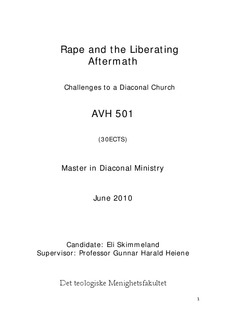| dc.description.abstract | This master thesis started out at a course about sexual abuse at the Norwegian Church Resource Center for Sexually Abused that I attended the fall of 2009, in relation to my studies in diaconal work. I have been interested in Liberation theology for a while, and it occurred to me that the Resource Center seemed to be using this theology in a practical way in their work with victims of sexually abuse. The work they are doing is diaconal by its very definition. The increasing problem of rape in our society, and seemingly, to my understanding, the small extent that the church has been involved with this vulnerable group in our society led me to my research question: “How feminist liberation theology can be a resource in diaconal work with victims of rape.” The church has focused more on this group in recent years, but it is still a long way to go. The resource center was established in 1996, as a statement that the Norwegian church is taking the problem of sexual violence in our society seriously. However according to their annual report they are not receiving sufficient government funding to run the center as they wish, this tells me, that is still a long way to go. | en_US |
